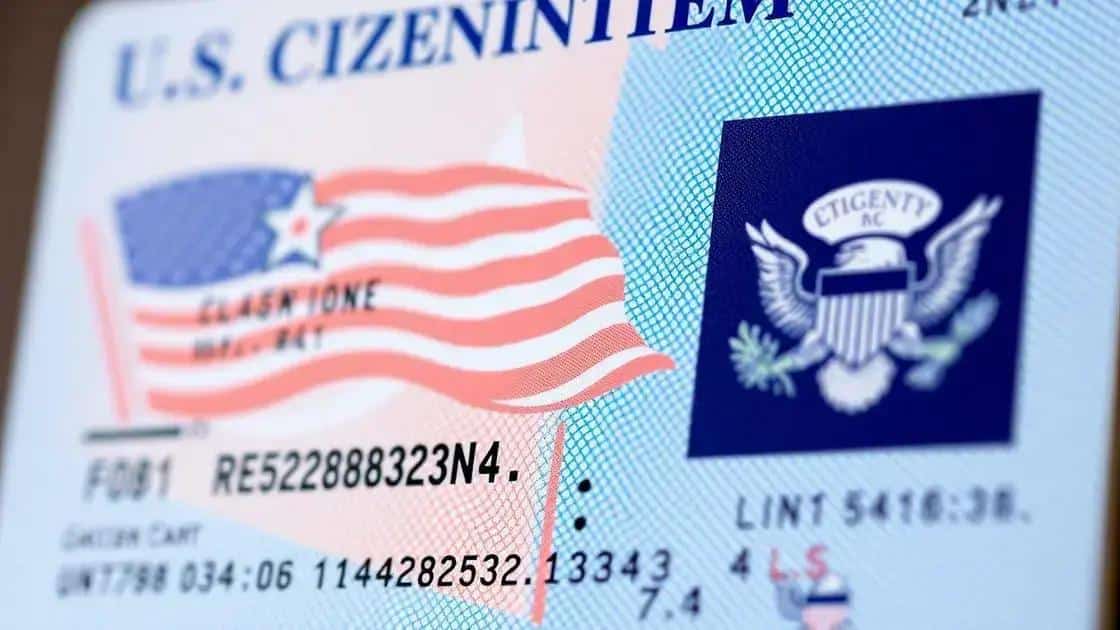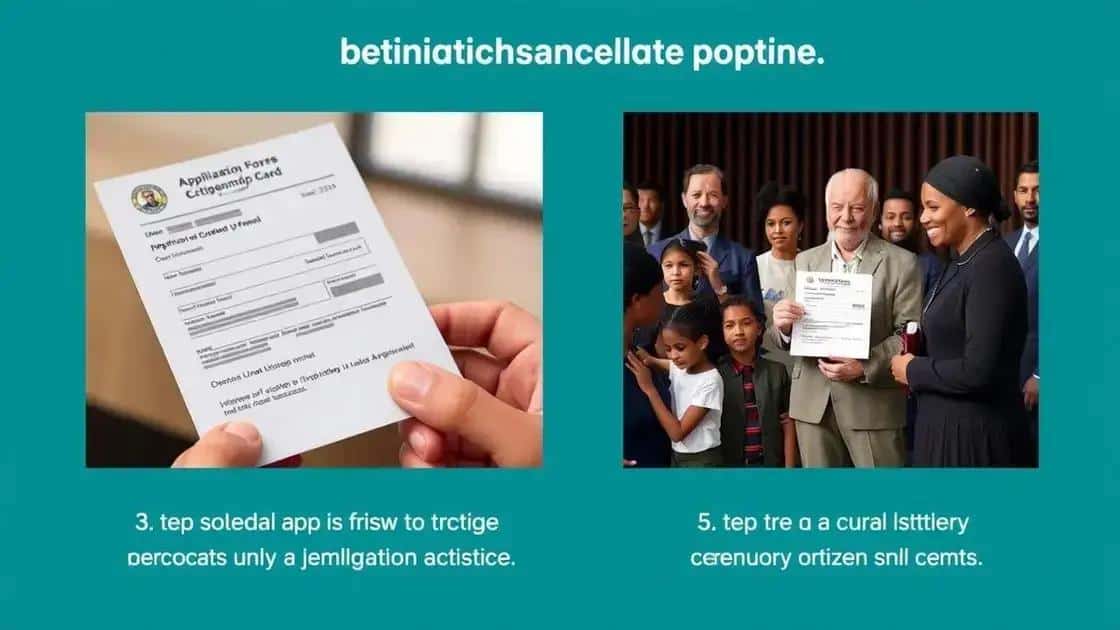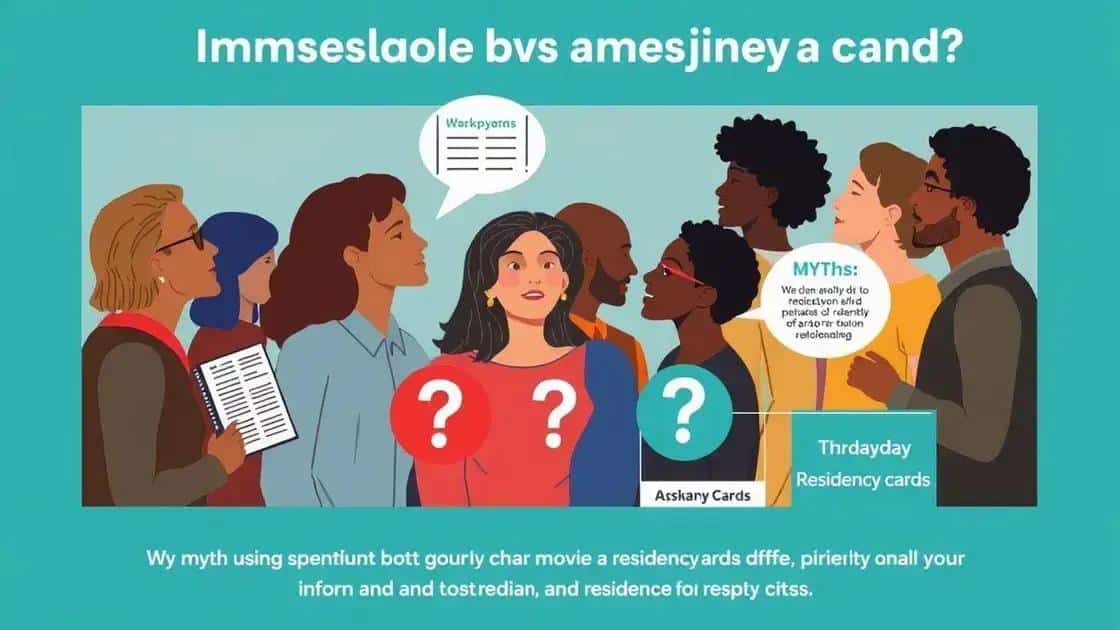Trump’s residency & citizenship card USA: what you need to know

Trump’s residency & citizenship card USA involves specific eligibility criteria, offers various rights, and requires renewal, while misconceptions often lead to confusion about its permanence and benefits.
Trump’s residency & citizenship card USA is a topic that piques curiosity for many. With the intersection of politics and immigration, there’s much to unpack. Are you aware of how this impacts the pathways available to immigrants today?
Understanding Trump’s residency in the USA
Understanding Trump’s residency in the USA can be quite complex. It involves several key elements that govern immigration laws and personal status. This topic has sparked much interest, especially among those curious about how residency impacts one’s legal standing and access to benefits.
What is Residency?
Residency refers to the legal status of living in a country with permission. In the context of the USA, it is essential to know the different types of residency, such as temporary and permanent. A permanent resident, often known as a green card holder, enjoys rights similar to those of citizens.
Trump’s Approach to Residency
Throughout his career, former President Trump has made various comments and decisions surrounding immigration and residency. He has emphasized the importance of legal immigration, often advocating for stricter laws. Understanding his policies helps in grasping how they might affect future immigrants.
Key Aspects of Trump’s Residency Policies
- Legal pathways: Trump aimed to create clear legal pathways for residency.
- Enforcement: Stricter enforcement of immigration laws was a hallmark of his administration.
- Merit-based immigration: He promoted a system prioritizing skilled workers.
- Visa limitations: Restrictions on certain visa categories were introduced.
The impact of these policies can vary widely. Individuals applying for residency during and after Trump’s administration often faced new regulations that influenced their applications. It is crucial to stay informed about the relevant laws to improve one’s chances.
Moreover, Trump’s influence on public opinion surrounding residency has been significant. His actions prompted discussions about the rights of immigrants and how they integrate into American society. As the conversation evolves, it’s vital to reflect on the role residency plays in shaping communities.
In summary, understanding Trump’s residency in the USA encompasses a range of legal and political factors, highlighting the intricate connection between immigration policies and personal experiences.
The process for obtaining a citizenship card

The process for obtaining a citizenship card in the USA involves several important steps. It’s crucial for applicants to understand what is required to navigate this path successfully.
Step 1: Determine Eligibility
Before starting, applicants should determine their eligibility. Generally, you must be a permanent resident for at least five years or three years if married to a U.S. citizen. Additional requirements may apply, including good moral character and knowledge of U.S. history.
Step 2: Complete the Application
The next step is to fill out Form N-400, the application for naturalization. This form requires personal information, residency status, and a brief history of your background. Make sure all information is accurate to avoid delays.
Step 3: Submit Your Application and Pay Fees
Once the form is complete, submit it along with the correct fees. Typically, the total cost includes the application fee and biometric services fee. After submission, you’ll receive a receipt indicating your application has been received.
Step 4: Attend Biometrics Appointment
After your application is accepted, you’ll be scheduled for a biometrics appointment. At this appointment, your fingerprints and photo will be taken. These are used for background checks.
Step 5: Interview
The interview is a crucial part of this process. You will meet with a USCIS officer who will review your application, ask questions, and test your knowledge of U.S. history and government. It’s essential to be prepared for this meeting.
- Be honest: Always provide truthful answers during your interview.
- Study: Review study materials for the civics test.
- Practice: Conduct mock interviews with friends or family.
After the interview, you will receive a decision on your application. If approved, you will be scheduled for a naturalization ceremony where you will take the Oath of Allegiance and receive your citizenship card. This card signifies your new status as a U.S. citizen and provides various rights and privileges.
Key benefits of the Visa Gold Permanent
The Visa Gold Permanent offers several advantages that make it an attractive option for individuals seeking long-term residency in the USA. Understanding these benefits can help applicants decide if this visa aligns with their goals.
1. Pathway to Permanent Residency
One of the main benefits of the Visa Gold Permanent is that it serves as a pathway to permanent residency. This means holders can live and work in the United States without the need for constant renewals. Permanent residency can lead to greater stability and security for individuals and their families.
2. Access to Work Opportunities
The Visa Gold Permanent allows individuals to work legally in any job without restrictions. This opens up a wide array of career options, enabling holders to pursue their professional ambitions freely. With more job opportunities comes the potential for economic growth and success.
3. Educational Benefits
Another key benefit is access to education. Visa Gold Permanent holders can enroll in public schools, colleges, and universities without facing the high costs that international students often incur. This access allows for better educational opportunities and a chance to invest in one’s future.
4. Family Sponsorship
Visa Gold Permanent holders can sponsor certain family members for residency, which means they can help their loved ones live and work in the USA. This benefit strengthens familial bonds and allows families to stay together.
- Staying Together: Families can be united in the USA.
- Shared Opportunities: Families can benefit from the same educational and work opportunities.
- Support System: Having family nearby provides emotional and financial support.
The benefits of the Visa Gold Permanent extend beyond just individual gain. They contribute to building strong communities and fostering a sense of belonging. Individuals feel empowered to contribute positively to society and the economy.
In conclusion, the Visa Gold Permanent offers numerous advantages, including a pathway to permanent residency, job opportunities, educational access, and family sponsorship. These benefits help create a more fulfilling life for holders and their families.
Common misconceptions about residency cards

There are many common misconceptions about residency cards that can create confusion among aspiring residents. Understanding these myths is crucial for navigating the immigration process successfully.
Myth 1: Residency Cards are Permanent
One common misconception is that residency cards, also known as green cards, guarantee permanent status in the USA. In reality, these cards must be renewed every ten years. Additionally, holders can lose their status if they violate immigration laws or leave the country for an extended period.
Myth 2: Everyone Can Get a Residency Card
Another myth is that anyone can obtain a residency card easily. In truth, the process requires meeting specific eligibility criteria, including family connections, employment opportunities, or refugee status. Each path has its own set of requirements that must be fulfilled.
Myth 3: Green Card Holders Have the Same Rights as Citizens
While green card holders enjoy many rights, they do not have the same privileges as citizens. For example, they cannot vote in federal elections, and they might have limited access to certain government benefits. Being aware of these differences is essential for understanding one’s rights and responsibilities.
Myth 4: Residency Cards are Difficult to Obtain
Some believe that the residency card application process is incredibly challenging and nearly impossible. While it does require documentation and adherence to procedures, understanding the steps and having the right support can make it much more manageable. Many applicants successfully navigate the process every year.
- Research thoroughly: Understand the requirements specific to your situation.
- Seek professional help: Consulting with an immigration lawyer can clarify the process.
- Be patient: The application process takes time, and persistence pays off.
Dispelling these common misconceptions helps potential applicants make informed decisions about their residency status and prepares them for what lies ahead. Knowledge is a powerful tool in ensuring a successful journey to becoming a resident.
FAQ – Common Misconceptions About Residency Cards
What is a residency card?
A residency card, often referred to as a green card, allows individuals to live and work permanently in the USA.
Do residency cards last forever?
No, residency cards need to be renewed every ten years, and holders can lose their status under certain conditions.
Can anyone get a residency card easily?
No, obtaining a residency card requires meeting specific eligibility criteria and going through an application process.
Do green card holders have the same rights as U.S. citizens?
Green card holders do not have all the rights of citizens; for example, they cannot vote in federal elections.





